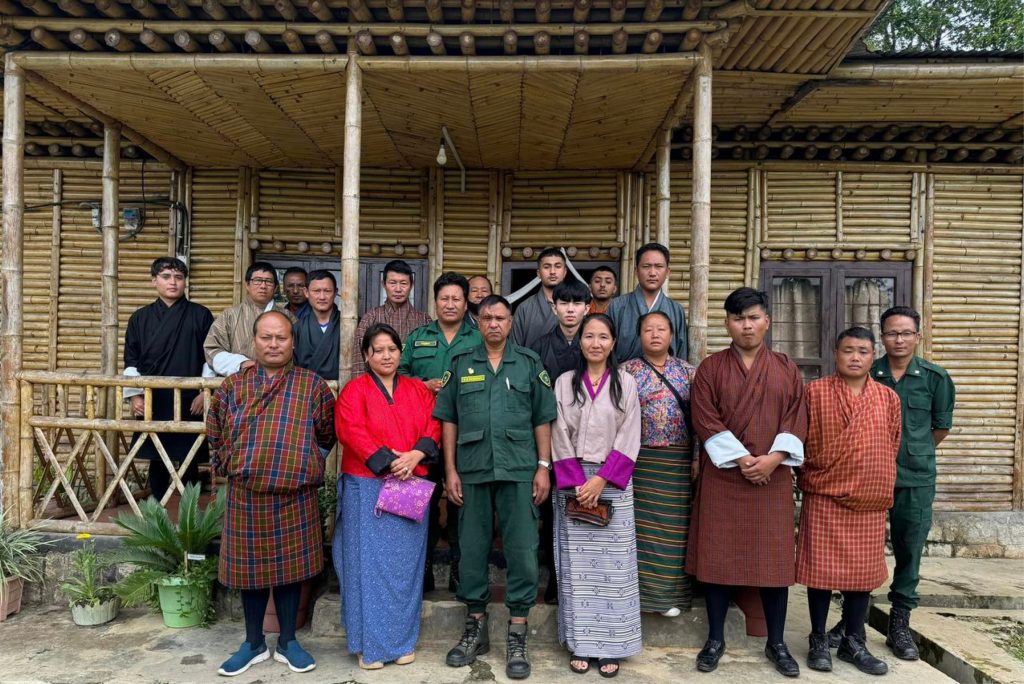Bhutan has forest coverage of 69.71 per cent with a total carbon sequestration potential of 11 million tonnes of CO2 per annum in the form of above-ground biomass accumulation(NFI, 2023). From this actual coverage, a small, very significant amount of forest is of planted forest. The Kuensel Newspaper issue of 3rd April 2023 reported that Bhutan has embarked on tree plantation since 1951 and by 2012 about 54,782.38 acres of plantation were carried out. If all these trees had survived, it would have been impenetrable in some areas. However, the same paper reported 62.20 per cent of the land planted with trees did not support the plantation, the trees either died or could not be traced.
There are various factors leading to the failure of the plantation, improper plan, lack of post plantation care, occurrence of development activities, poor seedling quality, harsh climatic conditions, mismatch of tree species and the area, and occurrence of natural disasters such as landslides, floods, and forest fires. Some even feel that due to poor technical skills and knowledge earlier, there are cases of wrong species being introduced to the area that led to a series of problems from drying water sources to issues of driving native species. Ultimately failure of plantation activity. It raises the concern of having basic knowledge and skills in raising plant nurseries and planting trees. The wrong in these processes will put significant risk to the whole ecology of the forest. To overcome such gaps mainly building the capacity of local communities, the two-day capacity-building workshop is currently underway in Tsirang.
The Royal Society for Protection of Nature(RSPN) in collaboration with the Tsirang Forest Divisional Office under the Department of Forest and Park Service(DoFPS) is conducting the workshop to build the skills and knowledge on establishing the nurseries and carrying out plantation activities. The workshop recognizes both indigenous and scientific knowledge of the nursery and plantation process. This workshop will significantly uplift the capacity of local communities and relevant stakeholders in sustaining the nurseries and plantations they have owned, and also venturing into new initiatives with a fresh outlook.
The workshop is delivered through theoretical presentation and practical demonstration. Some of the specific session outlines are the importance of having the right skills and knowledge; nursery establishment process; carrying out the plantation process; journaling, innovation, and post-plantation care that all drive towards success.
The participants attending this workshop are from diverse backgrounds representing different communities under Tsirang Dzongkhag. Many of them represent community forest and community-based nursery groups. The participants also include youths and teachers serving in the community. Their participation, especially of teachers will be important back at school in teaching the students on such subject matter and disseminating it in the communities. Overall, this workshop will contribute to boosting the economic condition of the community and also managing the biodiversity.
The workshop will end with free takeaways of nursery sapling gifts of preferred plant species choices by the participants and expected to plant the hope for a new beginning; some see it as business, some think it as a means to sustain the Indigenous crops, some feels they can enrich the biodiversity, some see as teaching material and for many, they see it is a future that has ecological, cultural, provisional and economic values.
𝗖𝗼𝗺𝗺𝘂𝗻𝗶𝘁𝘆-𝗯𝗮𝘀𝗲𝗱 𝗡𝘂𝗿𝘀𝗲𝗿𝘆 𝗘𝘀𝘁𝗮𝗯𝗹𝗶𝘀𝗵𝗺𝗲𝗻𝘁.
In the years 2021 and 2022, RSPN supported seven nursery sites in different communities of six districts. Based on a proposal received to establish the nursery by the communities, the RSPN through the International Climate Initiative(IKI) project supported the establishment of these nurseries. The nursery establishment priority was provided to communities with low income, women groups, and people being affected by COVID-19 pandemic the most, and based on feasibility and recommendations received from respective Divisional Forest Office in the project area.
To make the nursery establishment effective and successful, an agreement was drawn and agreed between RSPN and the respective nursery community groups. The agreement includes a buyback mechanism of tree saplings produced from the nurseries to support the plantation activity within the degraded habitats of White-bellied Heron(WBH). The type of tree saplings to be raised by the respective nurseries was also discussed and agreed. Nursery groups were encouraged to raise more native trees that are economically viable to the community and have ecological significance.
The provision to take up the nursery establishment by the community helped in building the capacity of the community to raise the nursery and also identifying as a means of entrepreneurship opportunities through it.
𝗣𝗹𝗮𝗻𝘁𝗮𝘁𝗶𝗼𝗻 𝘀𝘂𝗽𝗽𝗼𝗿𝘁.
Under the same project, IKI, RSPN targets to restore 50 hectares of degraded landscape of WBH with annually restoring 12.5 hectares. The Ecosystem and Socio-Economic Resilience Analysis Mapping (ESRAM) study was carried out in WBH landscape to identify some of the degraded areas that need restoration. Based on the ESRAM study, nine Gewogs from 31 Gewogs surveyed have been assessed as ‘highly vulnerable’, 15 Gewogs were assessed as ‘vulnerable’ while 7 Gewogs are categorized as ‘less vulnerable’. Ten sites were then selected for the intervention activity mainly to restore the degraded habitats of WBH through the plantation.
For the last three years, RSPN has brought close to 40 hectares of land under restoration through plantation. The plantation program includes afforestation in degraded lands, forest enrichment support to community forest groups and commercial plantation in private lands that are not feasible for crop cultivation. The choice of tree species supported is mostly of native tree species. A mutual agreement was also made between RSPN and beneficiaries that the plantation should consist of mixed tree species that have both ecological and economic values; plantation of commercial high-value tree species to benefit the communities; and plantation of wild fruiting trees that will benefit wildlife. This in the long run also targets to mitigate Human-Wildlife conflict.


Copyright © 2026 RSPN All Rights Reserved